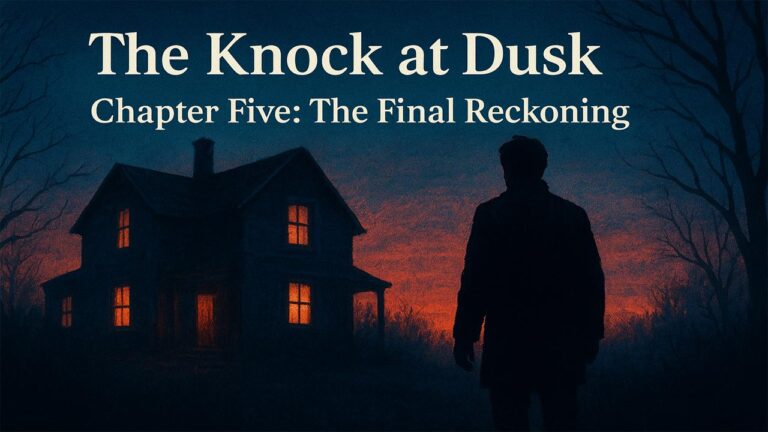Shadows of the Past
Mita backed away, breath shallow, poker still raised like it might shield her from ghosts, though she knew it could not.
“You’re insane,” she whispered, voice quivering. “I didn’t— I would never—”
📈 Promote your Business
🕒 1st Month FREE + Lifetime Plan Available!
“You loved him,” the stranger interrupted softly. “I know. And that’s what makes it worse.”
“Shut up,” she hissed, panic curling in her chest.
Outside, the storm raged with a ferocity that seemed alive, wind lashing around the house like a furious sentinel. The lights flickered once, then again, and the air vibrated with an unspoken warning.
Oliver growled low from the couch — the kind of growl that warned something far darker than any storm.
“You need to leave. Now.”
“I will,” the stranger said, calm yet insistent. “But not before we go downstairs.”
Her eyes widened. “No.”
“Yes.”
“There’s nothing down there.”
“There’s everything down there.”
He moved past her — steady, unhurried, a presence that owned the hallway.
She should have stopped him. Should have screamed. Should have struck, shoved, anything. But her body had become a prisoner of fear and anticipation.
Instead, she followed.
The Door of Truth

The basement door loomed at the end of the hallway, warped by decades of moisture, a silent sentinel of secrets long ignored. Mita rarely went down there; Sreezon had always handled it. Since his disappearance, she had kept it locked.
“Unlock it.” His voice was gentle but insistent.
“No.”
“You need to.”
“I said no.”
He paused, studying her as if reading her soul.
“You’ve felt it, haven’t you? Something beneath the surface. Not just grief. Not just loss. Something… else. Something that watches.”
Her hand moved almost instinctively to her pocket. She hated herself for wanting to know, for being drawn to the truth she had long buried.
The key turned in the lock with a click that echoed through the silent hallway, a harbinger of what lay ahead.
A dull yellow bulb flickered to life, humming faintly. Stale, cold air drifted up from the darkness below.
He descended first. Mita’s grip on the railing was all that tethered her to the world. When she followed, her feet felt like lead, each step a battle against the gravity of fear.
The Revelation
The basement sprawled before her, concrete floors lined with dusty shelves and forgotten boxes. The stranger stopped near the back, beside a crawl space covered by a slatted board.
“I’ve never seen that before,” Mita whispered.
“Yes, you have,” he said without turning. “You just made yourself forget.”
He crouched and pulled the board free.
Beneath lay a shallow pit. Earth, damp and disturbed.
Mita stepped closer, heart hammering. In the dirt lay fragments — a corner of leather, a scrap of cloth.
Her knees buckled. She dropped the poker. Fell.
Memories broke through the dam of repression — flashes of that night: the fight, his rage, her terror, the scream, the fall.
The sound his head made when it hit the basement step.
And her hands — digging, trembling, bleeding.
“No,” she gasped. “No, no—”
Confronting the Unforgivable
Tears streaked her cheeks as she looked at the stranger.
“Why are you doing this to me?”
“Because the dead don’t stay silent forever, Mita.”
Lightning split the sky, illuminating the pit. For a fleeting moment, it seemed bottomless, as if it led down into something older than the house itself.
She looked into it — into her actions, her guilt, the truth she had long denied.
The stranger rose slowly, a figure of calm inevitability.
“We’re not finished. Pretend it never happened? Pretend this never happened?”
His gaze flicked to the storm outside.
“The house knows. The ground remembers. And I’ll still be waiting.”
Each step he took up the stairs was deliberate, haunting. It was as if he had always been there, a guardian of the truth she could no longer deny.
And in that moment, Mita remembered everything.
The Emotional Crescendo
Every pulse in her body raced. Fear, horror, guilt, and sorrow collided, flooding her veins. The storm outside mirrored the storm within.
Her tears fell freely. Her chest heaved. And finally, a strange clarity: the truth was hers to bear, but the moment of facing it had released the weight that had bound her for so long.
The basement, the pit, the memories — they were not just revelations, they were liberation. Painful. Harrowing. Necessary.
And Mita stood there, trembling but alive, her mind finally unshackled.
FAQ (Frequently Asked Questions)
Why is the basement significant in the final chapter?
The basement holds the physical and psychological evidence of the past, forcing Mita to confront her buried memories and guilt.
How does the stranger impact Mita?
He acts as a catalyst, guiding her to face truths she suppressed, ensuring that the past cannot remain hidden.
What is the emotional core of this ending?
Fear, guilt, horror, and ultimately catharsis. Mita experiences the full release of repressed trauma, making it unforgettable.
Why is this ending memorable?
It combines suspense, supernatural tension, moral reckoning, and psychological horror — leaving the reader both shaken and emotionally moved.
How does the storm complement the story?
The storm externalizes Mita’s internal turmoil, enhancing tension and mirroring the emotional crescendo that culminates in revelation.

Your comment will appear immediately after submission.